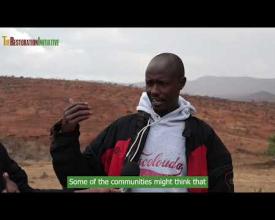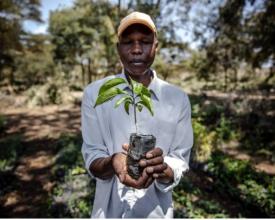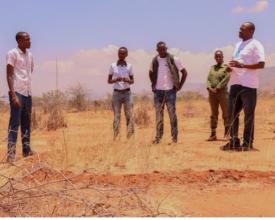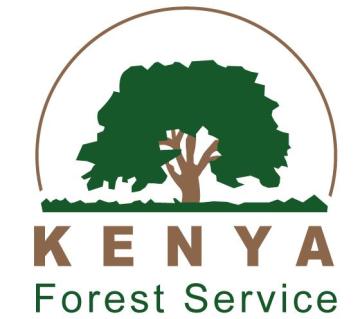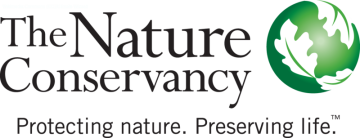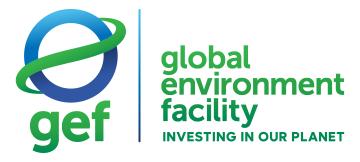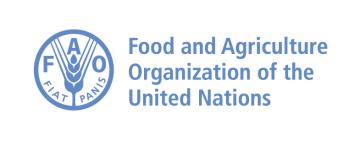
Strengthening national and county level policy and regulatory frameworks to support forest and landscape restoration in Kenya
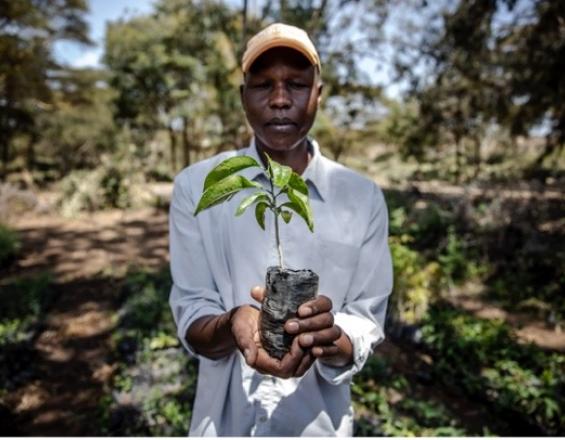
The Restoration Initiative (TRI) in Kenya arid and semi-arid lands region has assisted in strengthening policies and regulatory frameworks in support of forest and landscape restoration (FLR) in Kenya. One key product has been the Forest and Landscape Restoration Implementation Action Plan (FOLAREP), a national FLR strategy that includes a roadmap and monitoring framework to bridge existing gaps in FLR policy. The project has also contributed to the integration of relevant FLR and national natural resource management policies at the county and local levels by contributing to the elaboration of various county policies, including County Environment Action Plans and a Policy Influence Plan of FOLAREP. Additionally, TRI has elaborated a national strategy and action plan for sustainable commercialization of non-timber forest products (NTFPs) and services as well as Forest (Equitable Benefit Sharing) Regulations.
TRI is a GEF-funded project
Context
Challenges addressed
The major challenge TRI Kenya ASAL’s team faces is the lengthy policy processes that can last years before a policy is successfully validated, signed and launched. All the policies often need to go through various drafts, national working group discussions and editing, public consultations, and validation workshops before a finalized version could be presented for signing and final approval, which is no different for the FLR policies that the project is supporting. Because the process is lengthy, the policies could be more vulnerable to political changes such as elections, which recently took place as new leaders come with new visions and ambitions. However, even after Kenya’s recent elections, TRI’s policies have progressed and continue to have support from various levels of officials.
Location
Process
Summary of the process
By facilitating the development of a national FLR strategy, the integration of FLR and natural resource management in county policies, and the elaboration of a policy framework for the management of NTFPs, TRI Kenya ASAL worked to strengthen the national and county level policy and regulatory frameworks to support forest and landscape restoration in Kenya. With the creation of FOLAREP, development of the NTFPs Strategy, promotion of the forest regulation on equitable benefit sharing, and elaboration of county policies, TRI improved FLR regulation in Kenya as well as worked to implement strategies that push the enactment of restoration actions and equitably distribute their returns. As restoration is a long term program, the policy on NTFPs provides a window for the sustainable development of bio-enterprises which are low hanging fruits for restoration. The county level policies also help further expand restoration and implement the national policies by establishing local structures that make FLR regulation more efficient. In all, the policy milestones achieved by TRI and the various government agencies have contributed to a policy and regulatory framework in Kenya that better allows for FLR and sustainable natural resource management.
Building Blocks
Developing a Forest and Landscape Restoration (FLR) Implementation Action Plan and Monitoring Framework
TRI’s Kenya ASAL team supported the development of Forest and Landscape Restoration Implementation Plan (FOLAREP), an FLR strategy and monitoring framework formulated through a multi-stakeholder consultation process engaging experts from national institutions, the Council of Governors, County Governments, and non-state actors. The Ministry of Environment and Forestry (MoEF) established a diverse technical working group (TWG) in 2019 to develop FOLAREP. The draft was then subjected to public participation in seven clusters involving key stakeholders before being validated in a National stakeholders forum. The plan will ensure sustainable restoration of targeted landscapes and outlines the the key activities to be carried out, resources required, coordination framework and a robust monitoring and evaluation framework to promote an effective and efficient FLR programme in the country. TRI’s role included providing technical input as part of the national technical working group, as well as helping hold public consultations to ensure input from local communities was integrated. Additionally, TRI’s monitoring and enforcement (M&E) officer played a critical role in developing an M&E framework, which will track outcomes on policy and regulatory frameworks.
Enabling factors
To help successfully prepare FOLAREP, TRI also contributed to drafting the Roadmap for an FLR Action Plan, which outlined the process for elaborating the policy. With a coherent strategy, the TRI team was able to facilitate KFS’s drafting of FOLAREP. Additionally, without a participatory process that included county consultations and input from numerous stakeholders, the elaboration of the policy would have been less inclusive and left out the priorities of the local communities, which in turn, would have made it much harder to implement.
Lesson learned
Through the process of elaborating FOLAREP, the team gained many lessons, including the various parts of the policy process, county priorities, and the potential strategies for promoting FLR. By taking part in developing, validating, and approving the policy, TRI learned how participatory processes better facilitate the creation of FLR-based policies and where in the process barriers exist. The participatory process also highlighted county priorities, provided information about how the policy could be more effectively implemented, and enhanced local communities' participation and ownership of FOLAREP. Additionally, through input from the national technical working group in meetings such as the National Landscape Restoration Scaling Conference, TRI gathered information on what actions should be taken in the policy to further FLR action in Kenya.
Resources
Facilitating the Integration of Natural Resource Management and FLR Policies at the County and Local Levels
TRI has worked to integrate natural resource management and FLR policies at the county and local levels by facilitating the elaboration of multiple county policies. This includes the creation of a policy influence plan (PIP) to mainstream FOLAREP within county units and enable effective integrated restoration that targets multiple benefits for both people and the environment. TRI also provided technical input and logistical support for the creation of three County Environment Action Plans in Marsabit, Isiolo, and Laikipia counties. The final action plans have been drafted with validation workshops to take place now that recent elections have concluded. Once validated, the plans will go through the county assembly where they can be approved and actualized. These policies will facilitate the implementation of FOLAREP and further promote FLR with greater local context in the three counties. Furthermore, Isiolo County has developed a County Climate Change Policy and a County Rangeland management bill that both await approval. Additionally, the county produced a County Prosopis species management plan that has been operationalised.
Enabling factors
To be able to elaborate these county policies, TRI benefited from a willingness from county officials to implement policies that included FLR and sustainable natural resource management measures as well as the enthusiastic participation of local leaders in the consultations and workshops needed to draft the action plans. Without the political will to pursue FLR policies, the action plans would not have been able to be drafted.
Lesson learned
Throughout the process of creating the various county policies, TRI was able to learn lessons around how county policies and regulatory frameworks can be better suited to effectively integrate FLR in natural resource management and implement national FLR policies. The process also provided a road-map on how to elaborate and adopt policies at the county level. By working to develop the county action plans, TRI now knows better how to successfully enact future policies further promoting FLR and sustainable natural resource management.
Resources
Developing a Policy Framework for the Sustainable Commercialization of Non-Timber Forest Products and Services
TRI’s Kenya ASAL team has also supported the development of a policy framework for the management and utilization of NTFPs. The First National Strategy and action plan for Sustainable Commercialization of Non-Timber Forest Products and Services in Kenya has been developed to support sustainable production, extraction, utilization, access to finance and market development of NTFPs and Services value chains in Kenya. A multi-stakeholder consultative approach through a Technical Working Group (TWG) that includes TRI's National Project Coordinator (a renowned NTFPs specialist), held an inception meeting and developed the structure for the strategy and action plan which KEFRI used to develop an initial draft. A number of meetings were held to review and improve the draft strategy and action plan before subjecting it to public participation in seven clusters throughout the country. Additionally, TRI has helped the government develop their 2016 forest regulation on equitable benefit the Forest Conservation and Management Act, sharing with sensitization workshops and recommendations to ensure NTFP benefits are properly distributed.
Enabling factors
The development of the NTFPs Strategy was enabled by the robust literature review, surveys, and consultations undertaken by KEFRI. Without the review and situational analyses, the strategy would have missed appropriate intervention measures, stakeholder needs, and the contours of the various NTFP subsectors. TRI would also not have been able to pursue measures related to the equitable benefit sharing in forestry without the pursual of policy by the national government.
Lesson learned
By supporting the elaboration of the NTFPs Strategy, TRI gained critical information about how generating science-based information along with consultations helps develop more robust policies. As the team helped identify 14 NTFPs, including seed oils, indigenous fruits, medicinal plants aloes, dyes and tannins, and ecotourism, as well as potential government interventions the government, TRI worked to highlight science-based information and how it could be used in restoration. The process of consultations also underscored key potential interventions included in the strategy such as the establishment of local tree nurseries and the branding and certification of medicinal plants. By working to promote and develop the regulation on equitable benefit sharing, TRI was able to learn more about how to communicate with local communities and how equitable benefit sharing could most effectively be pursued in the forestry sector. In all, TRI Kenya ASAL learned that joining science-based knowledge with input from local communities allows for policies that address local issues with evidence-based measures.
Resources
Impacts
TRI Kenya ASAL’s work has resulted in a robust policy and regulatory framework for FLR, with policy milestones including the finalization of FOLAREP, the elaboration of the national NTFPs Strategy and action plan on sustainable commercialization NTFPs, the development of the Forest (Equitable Benefit Sharing) Regulations, County Environment Action Plans and a Policy Influence Plan. These milestones have contributed to a major difference with previous practice as well as a step towards the final goals of the project. FOLAREP marks a significant difference in practice as it will establish a new legal framework that ensures Kenya engages in and promotes FLR. Similarly, the NTFPs Strategy is the first national policy promoting the commercialization of NTFPs and will result in a growth of the sustainable use of NTFPs. The finalization of Forest (Equitable Benefit Sharing) Regulations also has a number of benefits to the stakeholders. All of the milestones also push the project towards its final goals to enhance resilient socio-economic development, improve ecological functioning and contribute to national and international commitments including climate change mitigation, UN decade on ecosystem restoration, the Bonn Challenge - to bring 350 million hectares under restoration by 2030 - and the African Forest Landscape Restoration Initiative (AFR100) amongst others.
Beneficiaries
The beneficiaries include the national and county governments, which often face financial limitations and time for developing these policies. The policies will also help local communities, which will benefit from greater restoration and NTFP commercialization.
Sustainable Development Goals
Story
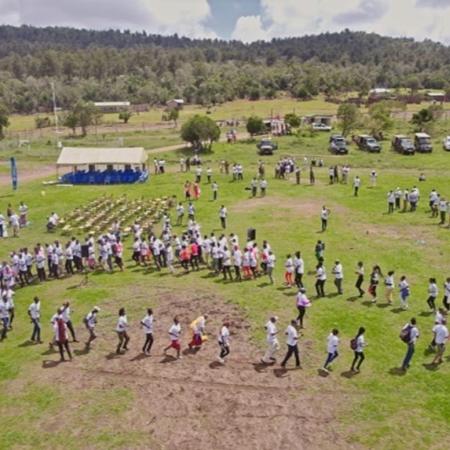
Thousands of Kenyans including men, women, and young people joined in person (400 walkers) and virtually in a 10-kilometre walk on 19th November 2022, which was organised by the ILMAMUSI Community Forest Association (CFA) in Mukogodo.
Mukogodo Forest is the largest forest in Laikipia County, covering 30,189 hectares of natural forest and it is one of the project sites for The Restoration Initiative (TRI) in Kenya. The walk was held to raise awareness about TRI, the Mukogodo forest restoration and tree planting, as well as to motivate local support to restore lands and forest landscapes in the Mukogodo ecosystem.
Out of a total 372 gazetted forests in the country, Mukogodo is one of the few remaining dry forests and the only one under exclusive management of an Indigenous community, the Yaaku.
FAO, through TRI, has been supporting ILMAMUSI CFA’s operations and project activities aimed at restoration of the Mukogodo landscape (tree planting, grass reseeding, capacity building of CFA members among others) and the “Walk Wild” event.
Participants in the walk were informed about the achievements of The Restoration Initiative and its activities in Mukogodo forest landscape. The walk also provided an opportunity to raise funds to support forest landscape restoration within the Mukogodo region of Kenya.
Virtual participants joined in thousands as viewers of the event via social and mass media platforms of Facebook, Twitter, Whatsapp, Instagram, radio and television.
The TRI project is being implemented through partners in Kenya among which are the Food and Agricultural Organisation of the United Nations (FAO), Kenya Forestry Reseach Institute (KEFRI), Laikipia Wildlife Forum (LWF), Kenya Wildlife Service (KWS), Kenya Forest Service (KFS), Borana Conservancy, Lewa Wildlife Conservancy (LWC), County Government of Laikipia, African Nature Investors (ANI), Laikipia Conservancies Association (LCA), Northern Rangeland Trust (NRT), IMPACT, community lands among many others.
A total of 1500 indigenous tree seedlings were also planted after the walk at Lokusero secondary school by all the participants.
The seedlings were provided by KFS and some of the seedlings also purchased by ILMAMUSI CFA.

